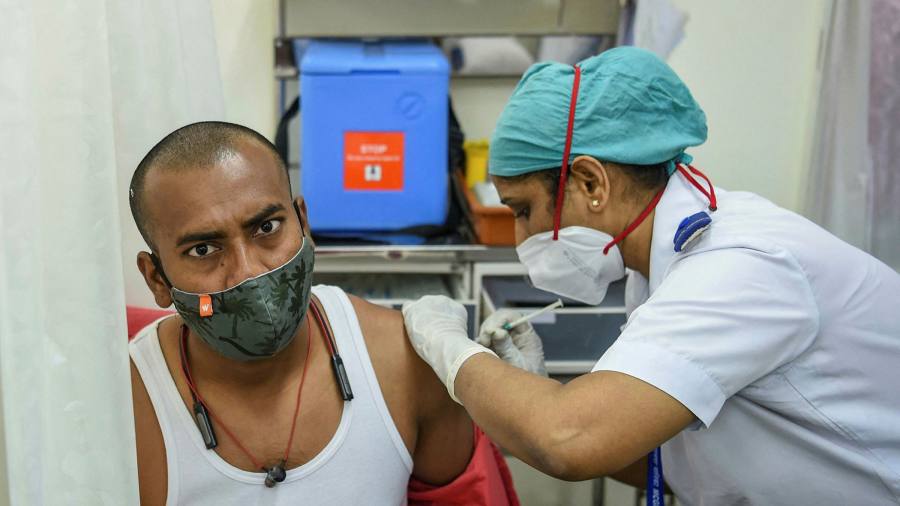[ad_1]
India’s private sector is urging the government to let business bolster New Delhi’s faltering Covid-19 inoculation campaign, as technical glitches and vaccine scepticism slow down the drive.Â
New Delhi has set an ambitious target of inoculating 300m people by August, including health workers, frontline workers and those older than 50.
But problems with the government’s CoWIN vaccination app, muted uptake and limited government capacity have constrained the campaign, with only 8.8m doses administered since the rollout began a month ago.
At this rate, it will take nearly three years to vaccinate even the initial target group.
Vaccine manufacturers are barred from selling jabs to any Indian entity except the central government. It has purchased only 21m doses from the Serum Institute of India, the world’s largest vaccine manufacturer, and a reported 10m doses from Bharat Biotech, a domestic producer that has developed its own vaccine.
The Confederation of Indian Industry has repeatedly urged New Delhi to permit private entities to purchase vaccines and administer them to their employees, families of staff and members of surrounding communities, following the government’s protocols on priority groups.
Even as the inoculation campaign limps along, the Serum Institute is exporting millions of doses of the Oxford/AstraZeneca vaccine to the rest of the world.
“We have a vaccine manufacturer that is prevented from supplying to India freely but can export freely,†said Naushad Forbes, former president of the Confederation of the Indian Industry and co-chair of engineering company Forbes Marshall.
“You have the bizarre situation of millions of doses ready; you have people who want the vaccine, you have people willing to administer them, and the only thing stopping that from happening is the existing government process.â€
Anand Mahindra, chairman of Mahindra Group, an autos-to-technology conglomerate, wrote on Twitter: “We need to harness the private sector’s capability to scale up distribution rapidly. Widespread vaccination is our main hope against any new waves which are now a serious threat.â€
Suresh Jadhav, executive director at the Serum Institute, said conglomerates such as Reliance Industries and Tata had inquired about obtaining vaccines for their workers and he hoped private entities could buy vaccines by March.
India, which has reported 10.9m coronavirus cases, began its vaccination campaign in mid-January, as its daily caseload plunged from a peak of nearly 100,000 per day in mid-September to about 13,000-14,000 a day.
However, technical glitches on the CoWIN app, used by the central government to handle vaccine logistics, including registration, have hampered the drive. This weekend, the names of some people eligible for a second dose were not reflected in the system.
The Indian Council of Medical Research did not respond to queries on the vaccine rollout, deferring to a committee that works directly under the prime minister’s office and the health ministry.
This week, Harsh Vardhan, the health minister, said no decision had been taken on making vaccines available on the private market. It was “the responsibility of the government to keep things totally under controlâ€, he told reporters.
But Forbes said that India had a chance to get ahead of the virus while new cases levels were relatively low, amid indications that infections were creeping up again as Indians relaxed adherence to wearing face masks and maintaining social distancing.
“There is a time element to this,†he said. “If we can use vaccinations on a mass scale in our cities, then we’ve got this thing beaten. If we wait for the infection rate to rise before we get our act together, we will have missed a big opportunity.â€
Coronavirus business update

How is coronavirus taking its toll on markets, business, and our everyday lives and workplaces? Stay briefed with our coronavirus newsletter.
[ad_2]
Source link






